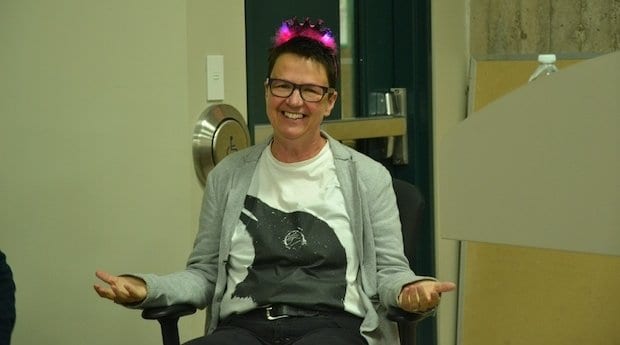Six candidates and a small but engaged group of audience members turned out to the University of Ottawa on Oct 9 for an election town hall, organized by PTS and with contributions from Jer’s Vision and the ACO. Somerset Ward 14 candidates Jeff Morrison, Denis Schryburt, Conor Meade, Catherine McKenney, Thomas McVeigh and Lili Weemen gathered to answer questions posed by the audience and from Facebook, Twitter, email and Instagram. The event was moderated by Bank Street BIA head Christine Leadman, and treats were provided by Xtra.
The questions were posed Jeopardy-style, and candidates had five minutes each to give their answers. At the end of each response, they were awarded points based on an audience vote. As the event was organized by some of the city’s key LGBT organizations, many of the questions dealt with issues facing the queer community, including Village gentrification, the lack of funding for LGBT organizations, the criminalization of HIV nondisclosure and harm reduction.
The event moved quickly, keeping the candidates on their toes. Morrison gained support from the audience for strong answers on questions about downtown vibrancy, which has been a key focus of his campaign. He referenced the Bank Street Glow Fair as an example of a successful event that drew people to the downtown Bank Street area. “It was a fantastic event because it was a form of activity. It was people coming together — that’s what we need to do more of in downtown,” he said, reiterating the need for open streets that encourage pedestrian traffic.
Morrison also spoke about the importance of making more downtown grocery options available and expressed support for keeping the Ottawa Public Library in Centretown, as well as bringing back downtown movie theatres. He spoke of the importance of lobbying the companies that run essential businesses. “The city can’t do everything itself. You need to lobby sometimes — you need to go talk to external partners to make things happen, and so it’s important to have those lobbying advocacy skills as a councillor.”
Morrison also responded well to questions about how to better engage the city’s homeless and disenfranchised populations in the voting process and increase their access to affordable housing, citing the approach taken by the City for All Women Initiative in going into lower-income areas and engaging with the people who live there.
Though Schryburt struggled to gain audience support, he made a case for increasing accessibility for people with disabilities in the downtown core, noting that it is a significant issue and that new developments must be built with accessible features. “Using the back door is not acceptable,” he said. He scored points for his response to a question about lowering the voting age for local elections to 16, saying he would support such a measure and referencing youth involvement in the recent Scottish referendum. “I think that [our youth] would really come through for us, and they would ask the hard questions that our adults are not really asking us right now.”
McVeigh fared well when questioned by the audience on how he would reduce the bureaucracy involved with trying to host public events in the city, calling the amount of red tape involved in hosting something as simple as a block party “quite simply extraordinary.” He called for a simplification of the city’s permit process and suggested that common-sense measures were needed, such as a reduction of the police presence at public events with 100 or fewer attendees. “What we’re trying to do is have joy in our community,” he said.
McVeigh’s response to a question posed by Xtra on how to deal with rising rents in the Village area and protect LGBT businesses was met with less support from the audience, however. “I don’t know how you protect [gay businesses], and I don’t know, especially, whether you should be protecting specific businesses,” he said. “What you can do is definitely encourage them.” McVeigh said that a lively business area with increased foot traffic and complementary businesses is key to the health of the Village. “Those businesses will do better if we make sure there’s enough people downtown, there’s enough traffic, and that the Bank Street BIA is thriving throughout the whole thing.”
McKenney gained audience approval for all her responses during the evening, coming out strongly in support of public housing and affordable transit. She also voiced her opposition to the criminalization of HIV nondisclosure and stated that she supports the rights of sex workers. “We need to make sure that women are safe,” she said. “We need to make sure the Supreme Court ruling stands. We cannot have women on our streets . . . in unsafe conditions.”
McKenney told the audience that gender-based violence affects everyone in a community. “You have to know what it is that makes women unsafe, and then you have to fix that, and that has to be the same for women sex-trade workers.”
When asked her thoughts on how to reduce violence in city housing and increase the quality of life for lower income people, McKenney responded that she would like to see the city invest $20,000,000 back into affordable housing in yearly increments. “I’ve lived in Ottawa community housing, [and] I’m quite familiar with Ottawa community housing,” she said, pointing to things like tenants’ groups that can help make neighbours more familiar with each other. She also spoke of the need for mental health support for people entering city housing from the shelter system. “Unless we wrap resources around people who have got serious mental illness, it will destabilize that building.”
Weemen faltered when questioned on how she would address the lack of funding for LGBT community organizations, saying more fundraising activities and grants were needed but failing to elaborate on how they could be implemented. She drew support, however, for her response to a question on whether she would make safer-sex materials beyond just condoms more readily and freely available to the public. “I would actually extend the program,” she said, adding that safer-sex resources should be available not just at universities and community health centres, but also in public washrooms. “It has to be just like toilet paper.”
Meade fared best on questions about whether he would support a safe injection site for Ottawa and how he would reduce street harassment and sexual assault. He said he would support a safe injection site but admitted that his initial reaction to the idea had been negative. “By reviewing the evidence, I came to a different conclusion,” he said. “The research has convinced me that this is the right idea.”
When questioned on how he would make Ottawa’s streets safer and reduce instances of sexual assault, Meade took a two-part approach to his answer, saying he would want to implement safer urban design, neighbourhood watches, foot patrols and increased police and transit security. He also addressed the social factors relating to sexual violence, saying that men in particular need to work to understand how their presence is interpreted and understand the point of view of women in their communities. “I think we need to encourage men — encourage everyone — to be more aware of that and act and behave in a way that promotes safety,” he said.
When it came time to tally the points at the end of the night, candidates Morrison and McVeigh both fared well, with 1,400 and 1,100 points respectively. Meade followed with a respectable 600 points. Weemen and Schryburt tied for last place with 200 points each.
But was McKenney, with 1,500 points, who took home the pink crown at the end of the night, ending the event on a strong note with her response to a question on what values she would bring to city hall. “I have very strong progressive values,” she said. “I am a queer woman, I have lived in poverty, and I have been a single parent. I will bring those values to city council.”
Election day in Ottawa is Monday, Oct 27.
For more on the candidates, visit
catherinemckenney.ca
jeff2014.ca
denisschryburt.ca
conormeade.ca
thomasmcveigh.com
liliweemen.wix.com/voteliliweemen


 Why you can trust Xtra
Why you can trust Xtra


